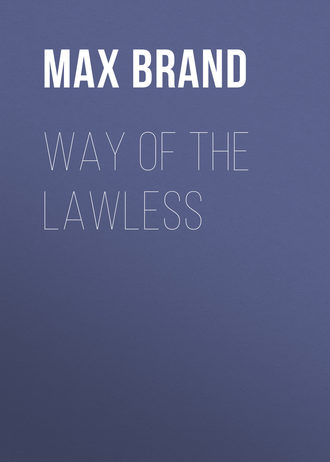
Макс Брэнд
Way of the Lawless
CHAPTER 32
The mare herself was in a far from safe condition. And if the marshal had roused himself from his grief and hurried up the slope on foot he would have found the fugitive out of the saddle and walking by the side of the played-out Sally, forcing her with slaps on the hip to keep in motion. She went on, stumbling, her head down, and the sound of her breathing was a horrible thing to hear. But she must keep in motion, for, if she stopped in this condition, Sally would never run again.
Andrew forced her relentlessly on. At length her head came up a little and her breathing was easier and easier. Before dark that night he came on a deserted shanty, and there he took Sally under the shelter, and, tearing up the floor, he built a fire which dried them both. The following day he walked again, with Sally following like a dog at his heels. One day later he was in the saddle again, and Sally was herself once more. Give her one feed of grain, and she would have run again that famous race from beginning to end. But Andrew, stealing out of the Roydon mountains into the lower ground, had no thought of another race. He was among a district of many houses, many men, and, for the final stage of his journey, he waited until after dusk had come and then saddled Sally and cantered into the valley.
It was late on the fourth night after he left Los Toros that Andrew came again to the house of John Merchant and left Sally in the very place among the trees where the pinto had stood before. There was no danger of discovery on his approach, for it was a wild night of wind and rain. The drizzling mists of the last three days had turned into a steady downpour, and rivers of water had been running from his slicker on the way to the ranch house. Now he put the slicker behind the saddle, and from the shelter of the trees surveyed the house.
It was bursting with music and light; sometimes the front door was opened and voices stole out to him; sometimes even through the closed door he heard the ghostly tinkling of some girl's laughter.
And that was to Andrew the most melancholy sound in the world.
The rain, trickling even through the foliage of the evergreen, decided him to act at once. It might be that all the noise and light were, after all, an advantage to him, and, running close to the ground, he skulked across the dangerous open stretch and came into the safe shadow of the wall of the house.
Once there, it was easy to go up to the roof by one of the rain pipes, the same low roof from which he had escaped on the time of his last visit. On the roof the rush and drumming of the rain quite covered any sound he made, but he was drenched before he reached the window of Anne's room. Could he be sure that on her second visit she would have the same room? He settled that by a single glance. The curtain was not drawn, and a lamp, turned low, burned on the table beside the bed. The room was quite empty.
The window was fastened, but he worked back the fastening iron with the blade of his knife and raised himself into the room. He closed the window behind him. At once the noise of rain and the shouting of the wind faded off into a distance, and the voices of the house came more clearly to him. But he dared not stay to listen, for the water was dripping around him; he must move before a large dark spot showed on the carpet, and he saw, moreover, exactly where he could best hide. There was a heavily curtained alcove at one end of the room, and behind this shelter he hid himself.
And here he waited. How would she come? Would there be someone with her? Would she come laughing, with all the triumph of the dance bright in her face?
Vaguely he heard the shrill droning of the violins die away beneath him, and the slipping of many dancing feet on a smooth floor fell to a whisper and then ceased. Voices sounded in the hall, but he gave no heed to the meaning of all this. Not even the squawking of horns, as automobiles drove away, conveyed any thought to him; he wished that this moment could be suspended to an eternity.
Parties of people were going down the hall; he heard soft flights of laughter and many young voices. People were calling gaily to one another and then by an inner sense rather than by a sound he knew that the door was opened into the room. He leaned and looked, and he saw Anne Withero close the door behind her and lean against it. In the joy of her triumph that evening?
No, her head was fallen, and he saw the gleam of her hand at her breast. He could not see her face clearly, but the bent head spoke eloquently of defeat. She came forward at length. Thinking of her as the reigning power in that dance and all the merriment below him, Andrew had been imagining her tall, strong, with compelling eyes commanding admiration. He found all at once that she was small, very small; and her hair was not that keen fire which he had pictured. It was simply a coppery glow, marvelously delicate, molding her face. She went to a great full-length mirror. She raised her head for one instant to look at her image, and then she bowed her head again and placed her hand against the edge of the mirror for support. Little by little, through the half light, he was making her out and now the curve of this arm, from wrist to shoulder, went through Andrew like a phrase of music. He stepped out from behind the curtain, and, at the sound of the cloth swishing back into place, she whirled on him.
She was speechless; her raised hand did not fall; it was as if she were frozen where she stood.
"I shall leave you at once," said Andrew quietly, "if you are frightened. You have only to tell me."
He had come closer. Now he was astonished to see her turn swiftly toward the door and touch his arm with her hand. "Hush!" she said. "Hush! They may hear you!"
She glided to the door into the hall and turned the lock softly and came to him again.
It made Andrew weak to see her so close, and he searched her face with a hungry and jealous fear, lest she should be different from his dream of her. "You are the same," he said with a sigh of relief. "And you are not afraid of me?"
"Hush! Hush!" she repeated. "Afraid of you? Don't you see that I'm happy, happy, happy to see you again?"
She drew him forward a little, and her hand touched his as she did so. She turned up the lamp, and a flood of strong yellow light went over the room. "But you have changed," said Anne Withero with a little cry. "Oh, you have changed! They've been hounding you—the cowards!"
"Does it make no difference to you—that I have killed a man."
"Ah, it was that brother to the Dozier man. But I've learned about him. He was a bloodhound like his brother, but treacherous. Besides, it was in fair fight. Fair fight? It was one against six!"
"Don't," said Andrew, breathing hard, "don't say that! You make me feel that it's almost right to have done what I've done. But besides him—all the rest—do they make no difference?"
"All of what?"
"People say things about me. They even print them." He winced as he spoke.
But she was fierce again; her passion made her tremble.
"When I think of it!" she murmured. "When I think of it, the rotten injustice makes me want to choke 'em all! Why, today I heard—I can't repeat it. It makes me sick—sick! Why, they've hounded you and bullied you until they've made you think you are bad, Andrew. They've even made you a little bit proud of the hard things people say about you. Isn't that true?"
Was it any wonder that Andrew could not answer? He felt all at once so supple that he was hot tallow which those small fingers would mold and bend to suit themselves.
"Sit down here!" she commanded.
Meekly he obeyed. He sat on the edge of his chair, with his hat held with both hands, and his eyes widened as he stared at her—like a person coming out of a great darkness into a great light.
And tears came into the eyes of the girl.
"You're as thin as a starved—wolf," she said, and closed her eyes and shuddered. "And all the time I've been thinking of you as you were when I saw you here before—the same clear, steady eyes and the same direct smile. But they've made you older—they've burned the boy out of you with pain! And I've been thinking about you just cantering through wild, gay adventures. Are you ill now?"
He had leaned back in the chair and gathered his hat close to his breast, crushing it.
"I'm not ill," said Andrew. His voice was hoarse and thick. "I'm just listening to you. Go on and talk."
"About you?" asked the girl.
"I don't hear your words—hardly; I just hear the sound you make." He leaned forward again and cast out his arm so that the palm of his hand was turned up beneath her eyes. She could see the long, lean fingers. It suddenly came home to her that every strong man in the mountain desert was in deadly terror of that hand. Anne Withero was shaken for the first time.
"Listen to me," he was saying in that tense whisper which was oddly like the tremor of his hand, "I've been hungry for that voice all these weeks—and months."
"I'll tell you what I'm going to do," said the girl, very grave. "I'm going to break up this cowardly conspiracy against you. I've written to my father to get the finest lawyer in the land and send him out here to make you—legal—again."
He began to smile, and shook his head.
"It's no use," he said. "Perhaps your lawyer could help me on account of Bill's death, but he couldn't help me from Hal."
"Are you—do you mean you're going to fight the other man, too?"
"He killed his horse chasing me," said Andrew. "I couldn't stop to fight him because I was comin' down here to see you. But when I go away I've got to find him and give him a chance back at me. It's only fair."
"Because he killed a horse trying to get you, you're going to give him a chance to shoot you?"
Her voice had become shrill. She lowered it instinctively toward the end and cast a glance of apprehension toward the door.
"You are quite mad," said the girl.
"You don't understand," said Andrew. "His horse was Gray Peter—the stallion. And I would rather have killed a man than have seen Gray Peter die. Hal had Peter's head in his arms," he added softly. "And he'll never give up the trail until he's had it out with me. He wouldn't be half a man if he let things drop now."
"So you have to fight Hal Dozier?"
"Yes."
"But when that's done—"
"When that's done one of us will be dead. If it's me, of course, there's no use worryin'; if it's Hal, of course, I'm done in the eyes of the law. Two—murders!"
His eyes glinted and his fingers quivered. It sent a cold thrill through the girl.
"But they say he's a terrible man, Andrew. You wouldn't let him catch you?"
"I won't stand and wait for him," said Andrew gravely. "But if we fight I think I'll kill him."
"What makes you think that?" She was more curious than shocked.
"It's just a sort of feeling that you get when you look at a man; either you're his master or you aren't. You see it in a flash."
"Have you ever seen your master?" asked the girl slowly.
"I'll want to die when I see that," he said simply.
Suddenly she clenched her hands and sat straight up.
"It's got to be stopped," she said hotly. "It's all nonsense, and I'm going to see that you're both stopped." "Four days ago," he said, "you could have taken me in the hollow of your hand. I would have come to you and gone from you at a nod. That time is about to end."
He paused a little, and looked at her in such a manner that she was frightened, but it was a pleasant fear. It made her interlace her fingers with nervous anxiety, but it set a fire in her eyes.
"That time is ending," said Andrew. "You are about to be married."
"And after that you will never look at me again, never think of me again?"
"I hope not," he answered. "I strongly hope not."
"But why? Is a marriage a blot or a stain?"
"It is a barrier," he answered.
"Even to thoughts? Even to friendship?"
"Yes."
A very strange thing happened in the excited mind of Anne Withero. It seemed to her that Charles Merchant sat, a filmy ghost, beside this tattered fugitive. He was speaking the same words that Andrew spoke, but his voice and his manner were to Andrew Lanning what moonshine is to sunlight. She had been thinking of Charles Merchant as a social asset; she began to think of him now as a possessing force. Anne Withero possessed by Charlie Merchant!
"What you have told me," she said, "means more than you may think to me. Have you come all this distance to tell me?"
"All this distance to talk?" he said. He seemed to sit back and wonder. "Have I traveled four days?" he went on. "Has Gray Peter died, and have I been under Hal Dozier's rifle only to speak to you?" He suddenly recalled himself.
"No, no! I have come to give you a wedding present."
He watched her color change.
"Are you angry? Is it wrong to give you a present?"
"No," she answered in a singular, stifled voice. "It is this watch." It was a large gold watch and a chain of very old make that he put into her hand. "It is for your son," said Andrew.
She stood up; he rose instinctively.
"When I look at it I'm to remember that you are forgetting me?"
A little hush fell upon them.
"Are you laughing at me, Anne?"
He had never called her by her name before, and yet it came naturally upon his lips.
She stood, indeed, with the same smile upon her lips, but her eyes were fixed and looked straight past him. And presently he saw a tear pass slowly down her face. Her hand remained without moving, with the watch in it exactly as he had placed it there.
She had not stirred when he slipped without a noise through the window and was instantly swallowed in the rushing of the wind and rain.
CHAPTER 33
There was, as Andrew had understood for a long time, a sort of underground world of criminals even here on the mountain desert. Otherwise the criminals could not have existed for even a moment in the face of the organized strength of lawful society. Several times in the course of his wanderings Andrew had come in contact with links of the underground chain, and he learned what every fugitive learns—the safe stopping points in the great circuit of his flight.
Three elements went into the making of that hidden society. There was first of all the circulating and active part, and this was composed of men actually known to be under the ban of the law and openly defying it. Beneath this active group lay a stratum much larger which served as a base for the operating criminals. This stratum was built entirely of men who had at one time been incriminated in shady dealings of one sort and another. It included lawbreakers from every part of the world, men who had fled first of all to the shelter of the mountain desert and who had lived there until their past was even forgotten in the lands from which they came. But they had never lost the inevitable sympathy for their more active fellows, and in this class there was included a meaner element—men who had in the past committed crimes in the mountain desert itself and who, from time to time, when they saw an absolutely safe opportunity, were perfectly ready and willing to sin again.
The third and largest of all the elements in the criminal world of the desert was a shifting and changing class of men who might be called the paid adherents of the active order. The "long riders," acting in groups or singly, fled after the commission of a crime and were forced to find places of rest and concealment along their journey. Under this grave necessity they quickly learned what people on their way could be hired as hosts and whose silence and passive aid could be bought. Such men were secured in the first place by handsome bribes. And very often they joined the ranks unwillingly. But when some peaceful householder was confronted by a desperate man, armed, on a weary horse—perhaps stained from a wound—the householder was by no means ready to challenge the man's right to hospitality. He never knew when the stranger would take by force what was refused to him freely, and, if the lawbreaker took by force, he was apt to cover his trail by a fresh killing.
Of course, such killings took place only when the "long rider" was a desperate brute rather than a man, but enough of them had occurred to call up vivid examples to every householder who was accosted. As a rule he submitted to receive the unwelcome guest. Also, as a rule, he was weak enough to accept a gift when the stranger parted. Once such a gift was taken, he was lost. His name was instantly passed on by the fugitive to his fellows as a "safe" man. Before long he became, against or with his will, a depository of secrets—banned faces became known to him. And if he suddenly decided to withdraw from that criminal world his case was most precarious.
The "long riders" admitted no neutrals. If a man had once been with them he could only leave them to become an enemy. He became open prey. His name was published abroad. Then his cattle were apt to disappear. His stacks of hay might catch fire unexpectedly at night. His house itself might be plundered, and, in not infrequent cases, the man himself was brutally murdered. It was part of a code no less binding because it was unwritten.
All of this Andrew was more or less aware of, and scores of names had been mentioned to him by chance acquaintances of the road. Such names he stored away, for he had always felt that time impending of which Henry Allister had warned him, the time when he must openly forget his scruples and take to a career of crime. That time, he now knew, was come upon him.
It would be misrepresenting Andrew to say that he shrank from the future. Rather he accepted everything that lay before him wholeheartedly, and, with the laying aside of his scruples, there was an instant lightening of the heart, a fierce keenness of mind, a contempt for society, a disregard for life beginning with his own. One could have noted it in the recklessness with which he sent Sally up the slope away from the ranch house this night.
He had made up his mind immediately to hunt out a "safe" man, recently mentioned to him by that unconscionable scapegrace Harry Woods, crooked gambler, thief of small and large, and whilom murderer. The man's name was Garry Baldwin, a small rancher, some half day's ride above Sullivan's place in the valley. He was recommended as a man of silence. In that direction Andrew took his way, but, coming in the hills to a dished-out place on a hillside, where there was a natural shelter from both wind and rain, he stopped there for the rest of the night, cooked a meal, rolled himself in his blankets, and slept into the gray of the morning.
No sooner was the first light streaking the horizon to the east than Andrew wakened. He saddled Sally and, after a leisurely breakfast, started at a jog trot through the hills, taking the upslope with the utmost care. For nothing so ruins a horse as hard work uphill at the very beginning of the day. He gave Sally her head, and by letting her go as she pleased she topped the divide, breathing as easily as if she had been walking on the flat. She gave one toss of her head as she saw the long, smooth slope ahead of her, and then, without a word from Andrew or a touch of his heels, she gave herself up to the long, rocking canter which she could maintain so tirelessly for hour on hour.
A clear, cold morning came on. Indeed, it was rarely chill for the mountain desert, with a feel of coming snow in the wind. Sally pricked one ear as she looked into the north, and Andrew knew that that was a sign of trouble coming.
He came in the middle of the morning to the house of Garry Baldwin. It was a wretched shack, the roof sagged in the middle, and the building had been held from literally falling apart by bolting an iron rod through the length of it.
A woman who fitted well into such a background kicked open the door and looked up to Andrew with the dishwater still dripping from her red hands. He asked for her husband. He was gone from the house. Where, she did not know. Somewhere yonder, and her gesture included half the width of the horizon to the west. There was his trail, if Andrew wished to follow it. For her part, she was busy and could not spare time to gossip. At that she stepped back and kicked the door shut with a slam that set the whole side of the shack shivering.
At that moment Andrew wondered what he would have done when he lived in Martindale if he had been treated in such a manner. He would have crimsoned to the eyes, no doubt, and fled from the virago. But now he felt neither embarrassment nor fear nor anger. He drew his revolver, and with the heavy butt banged loudly on the door. It left three deep dents in the wood, and the door was kicked open again. But this time he saw only the foot of the woman clad in a man's boot. The door remained open, but the hostess kept out of view.
"You be ridin' on, friend," she called in her harsh voice. "Bud, keep out'n the kitchen. Stranger, you be ridin' on. I don't know you and I don't want to know you. A man that beats on doors with his gun!"
Andrew laughed, and the sound brought her into view, a furious face, but a curious face as well. She carried a long rifle slung easily under her stout arm.
"What d'you want with Garry?" she asked.
And he replied with a voice equally hard: "I want direction for finding Scar-faced Allister."
He watched that shot shake her.
"You do? You got a hell of a nerve askin' around here for Allister! Slope, kid, slope. You're on a cold trail."
"Wait a minute," protested Andrew. "You need another look at me."
"I can see all there is to you the first glance," said the woman calmly. "Why should I look again?"
"To see the reward," said Andrew bitterly. He laughed again. "I'm Andrew Lanning. Ever hear of me?"
It was obvious that she had. She blinked and winced as though the name stunned her. "Lanning!" she said. "Why, you ain't much more'n a kid. Lanning! And you're him?"
All at once she melted.
"Slide off your hoss and come in, Andy," she said. "Dogged if I knew you at all!"
"Thanks. I want to find Allister and I'm in a hurry."
"So you and him are goin' to team it? That'll be high times! Come here, Bud. Look at Andy Lanning. That's him on the horse right before you."
A scared, round face peered out at Andrew from behind his mother. "All right, partner. I'll tell you where to find him pretty close. He'll be up the gulch along about now. You know the old shack up there? You can get to him inside three hours—with that hoss." She stopped and eyed Sally. "Is that the one that run Gray Peter to death? She don't look the part, but them long, low hosses is deceivin'. Can't you stay, Andy? Well, s'long. And give Allister a good word from Bess Baldwin. Luck!"
He waved, and was gone at a brisk gallop.






